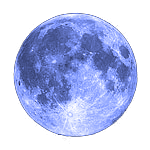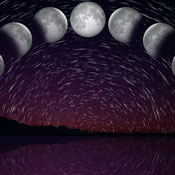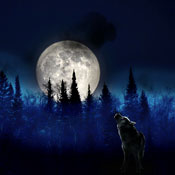Traditional Full Moon Names
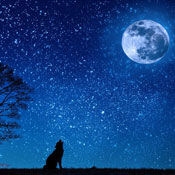 Wolf Moon
Wolf Moon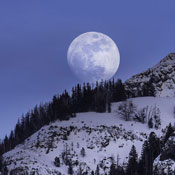 Snow Moon
Snow Moon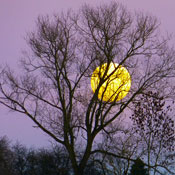 Worm Moon
Worm Moon Pink Moon
Pink Moon Flower Moon
Flower Moon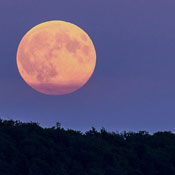 Strawberry Moon
Strawberry Moon Buck Moon
Buck Moon Sturgeon Moon
Sturgeon Moon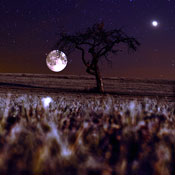 Harvest Moon
Harvest Moon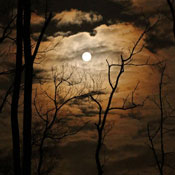 Hunter's Moon
Hunter's Moon Beaver Moon
Beaver Moon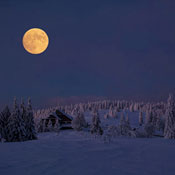 Cold Moon
Cold Moon
Why does the full moon have a name? The changing moon was used as a guide to time, to track the passing of the year. There was no Julian or Gregorian calendar, and the farmers didn't have their trusty almanacs. In ancient cultures, the name given to the moon often referred to the whole month.
The names we use today for the moon in English-speaking countries come from three broad traditions: Native American, Celtic and Anglo Saxon. Colonial farmers adopted Native American names, and in European countries like Britain, the terms were simply handed down.
The Native American moons vary depending on the tribe and its resources. Did you grow crops ("Corn Moon") or fish ("Sturgeon Moon") to feed your families? Some of the names are wonderfully observed: "Moon when the ponies shed" or "Moon young ducks begin to fly". Other names speak of the hardship suffered in winter, like the"Cold Moon" and "Time of much poverty".
Anglo Saxon names are similarly rooted in the land with "Hay Moon","Milk Moon" and "Blood Moon" (when livestock are slaughtered). The earlier Celtic names give a glimpse of their year through rituals, such as "Mourning Moon" for the cleansing time around the Winter Equinox and the "Mead Moon" for the summer celebrations.
Of course, we're talking simply northern hemisphere names here. The southern hemisphere has its own traditions. The Maori lunar calendar is beautifully phrased: for example, June-July is Hongonui, "Man is now extremely cold and kindles fires before which he basks".
Across the world, the traditional lunar names give us fascinating snapshots into everyday lives, and the relationship between humans and nature. From the beautiful ("Strawberry Moon") to the practical ("Time when corn is taken in"), the names of the full moon connect us with the past.
You might also like...
Moon phase today

Waning Crescent
Next full moons
-
3rd January, 2026
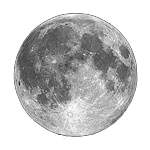
-
1st February, 2026

-
3rd March, 2026

-
2nd April, 2026

-
1st May, 2026

-
31st May, 2026
